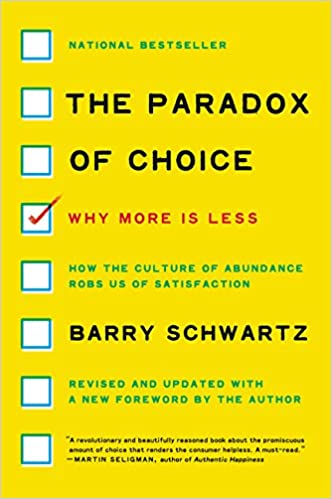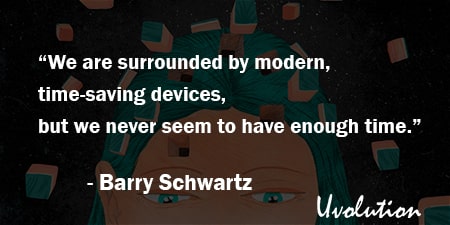The Paradox of Choice by Barry Schwartz
The Book in 1 Sentences
“The fact that some choice is good doesn’t necessarily mean that more choice is better. As I will demonstrate, there is a cost to having an overload of choice. As a culture, we are enamored of freedom, self-determination, and variety, and we are reluctant to give up any of our options. But clinging tenaciously to all the choices available to us contributes to bad decisions, to anxiety, stress, and dissatisfaction— even to clinical depression.” ~ Barry Schwartz
5 BIG Ideas
1. Don’t be seduced by branding!
2. Choosing wisely begins with developing a clear understanding of your goals.
3. Having too many choices produces psychological distress.
4. Consciously striving to be grateful more often for what is good about a choice or an experience, and to be disappointed less by what is bad...
5. By comparing ourselves to others less, we will be satisfied more...
The Paradox of Choice Summary
“Throughout the book, you will learn about a wide range of research findings from psychologists, economists, market researchers, and decision scientists, all related to choice and decision making. There are important lessons to be learned from this research, some of them not so obvious, and others even counterintuitive. For example, I will argue that:
1. We would be better off if we embraced voluntary constraints on our freedom of choice, instead of rebelling against them.
2. We would be better off seeking what was “good enough” instead of seeking the best (have you ever heard a parent say, “I want only the ‘good enough’ for my kids?”).
3. We would be better off if we lowered our expectations about the results of decisions.
4. We would be better off if the decisions we made were nonreversible.
5. We would be better off if we paid less attention to what others around us were doing.
These conclusions fly in the face of conventional wisdom that the more choices people have, the better off they are, that the best way to get good results is to have very high standards, and that it’s always better to have a way to back out of a decision than not. What I hope to show is that the conventional wisdom is wrong, at least when it comes to what satisfies us in the decisions we make.”
1. Seduced by Branding!
“According to James Twitchell, the key insight that has shaped modern advertising came to cigarette manufacturers in the 1930s. In the course of market research, they discovered that smokers who taste-tested various cigarette brands without knowing which was which couldn’t tell them apart.
So, if the manufacturer wanted to sell more of his particular brand, he was either going to have to make it distinctive or make consumers think it was distinctive, which was considerably easier. With that was born the practice of selling a product by associating it with a glamorous lifestyle.
We probably like to think that we’re too smart to be seduced by such “branding,” but we aren’t.”
“Americans go to shopping centers about once a week, more often than they go to houses of worship, and Americans now have more shopping centers than high schools. In a recent survey, 93 percent of teenage girls surveyed said that shopping was their favorite activity.”
2. Are You a Maximizer or Satisficer?
“Choosing wisely begins with developing a clear understanding of your goals. And the first choice you must make is between the goal of choosing the absolute best and the goal of choosing something that is good enough.
If you seek and accept only the best, you are a maximizer... Maximizers need to be assured that every purchase or decision was the best that could be made. Yet how can anyone truly know that any given option is absolutely the best possible? ... As a decision strategy, maximizing creates a daunting task, which becomes all the more daunting as the number of options increases.
The alternative to maximizing is to be a satisficer. To satisfice is to settle for something that is good enough and not worry about the possibility that there might be something better. A satisficer has criteria and standards. She searches until she finds an item that meets those standards, and at that point, she stops.”
Schwartz continues: “The difference between the two types is that the satisficer is content with the merely excellent as opposed to the absolute best.
I believe that the goal of maximizing is a source of great dissatisfaction, that it can make people miserable—especially in a world that insists on providing an overwhelming number of choices, both trivial and not so trivial.”
He also says “Increased choice may actually contribute to the recent epidemic of clinical depression affecting much of the Western world.”
3. The Difference Between Perfectionists and Maximizers
“Thus, perfectionists, like maximizers, seek to achieve the best. But I think there is an important difference between them. While maximizers and perfectionists both have very high standards, I think that the perfectionists have very high standards that they don’t expect to meet, whereas the maximizers have very high standards they do expect to meet.
Which may explain why we found that those who score high on perfectionism, unlike maximizers, are not depressed, regretful, or unhappy.
Perfectionists may not be as happy with the results of their actions as they should be, but they seem to be happier with the results of their actions than maximizers are with the results of theirs.”
Schwartz also says that: “It should also be clear that the problem of regret will loom larger for maximizers than for satisficers.
No matter how good something is, if a maximizer discovers something better, he’ll regret having failed to choose it in the first place.
Perfection is the only weapon against regret, and endless, exhaustive, paralyzing consideration of the alternatives is the only way to achieve perfection.
For a satisficer, the stakes are lower. The possibility of regret doesn’t loom as large, and perfection is unnecessary.”
“By some estimates, depression in the year 2000 was about ten times as likely as depression in the year 1900.”
“The trick is to learn to embrace and appreciate satisficing, to cultivate it in more and more aspects of life, rather than merely being resigned to it.”
4. We are BOTH Maximizers & Satisficers
“The truth is that maximizing and satisficing orientations tend to be “domain specific.” Nobody is a maximizer in every decision, and probably everybody is in some.
Perhaps what distinguishes maximizers from satisficers is the range and number of decisions in which an individual operates as one or the other.
This is good news, because what it means is that most of us have the capacity to be satisficers.
The task, then, for someone who feels overwhelmed by choices, is to apply the satisficing strategy more often, letting go of the expectation that “the best” is attainable.”
5. How to Solve this Problem?!
“The news I’ve reported is not good. Here we are, living at the pinnacle of human possibility, awash in material abundance.
As a society, we have achieved what our ancestors could, at most, only dream about, but it has come at a great price. We get what we say we want, only to discover that what we want doesn’t satisfy us to the degree we expect.
We are surrounded by modern, time-saving devices, but we never seem to have enough time. We are free to be the authors of our own lives, but we don’t know exactly what kind of lives we want to “write.”
The “success” of modernity turns out to be bittersweet, and everywhere we look it appears that a significant contributing factor is the overabundance of choice.
Having too many choices produces psychological distress, especially when combined with regret, concern about status, adaptation, social comparison, and perhaps most important, the desire to have the best of everything—to maximize.
I believe there are steps we can take to mitigate—even eliminate—many of these sources of distress, but they aren’t easy. They require practice, discipline, and perhaps a new way of thinking. On the other hand, each of these steps will bring its own rewards.”
6. Strive to Be Grateful
“We can vastly improve our subjective experience by consciously striving to be grateful more often for what is good about a choice or an experience, and to be disappointed less by what is bad...
It may seem demeaning to accept the idea that experiencing gratitude takes practice.
Why not just tell yourself that “starting tomorrow, I’m going to pay more attention to what’s good in my life,” and be done with it? The answer is that habits of thought die hard. Chances are good that if you gave yourself that general directive, you won’t actually follow it. Instead you might consider adopting a simple routine:
1. Keep a notepad at your bedside.
2. Every morning, when you wake up, or every night, when you go to bed, use the notepad to list five things that happened the day before that you’re grateful for.
These objects of gratitude occasionally will be big (a job promotion, a great first date), but most of the time, they will be small (sunlight streaming in through the bedroom window, a kind word from a friend, a piece of swordfish cooked just the way you like it, an informative article in a magazine).
3. You will probably feel a little silly and even self-conscious when you start doing this. But if you keep it up, you will find that it gets easier and easier, more and more natural.
You may also find yourself discovering many things to be grateful for on even the most ordinary of days. Finally, you may find yourself feeling better and better about your life as it is, and less and less driven to find the “new and improved” products and activities that will enhance it.”
7. STOP Social Comparison
“We evaluate the quality of our experiences by comparing ourselves to others. Though social comparison can provide useful information, it often reduces our satisfaction. So by comparing ourselves to others less, we will be satisfied more...
...social comparison seems sufficiently destructive to our sense of well-being that it is worthwhile to remind ourselves to do it less. Because it is easier for a satisficer to avoid social comparison than for a maximizer, learning that “good enough” is good enough may automatically reduce concern with how others are doing.
Following the other suggestions I’ve made may sometimes mean that when judged by an absolute standard, the results of decisions will be less good than they might otherwise have been—all the more reason to fight the tendency to make social comparisons.
So:
1. Remember that “He who dies with the most toys wins” is a bumper sticker, not wisdom.
2. Focus on what makes you happy, and what gives meaning to your life.”
Remember that: “The more social comparison you do, the more likely you are to be affected by it, and the direction of such effects tends to be negative.”
That was my QUICK The Paradox of Choice summary. If you’re interested, get your copy. There is a HUGE amount of wisdom and life-changing ideas in this book, and we’ve only touched on a tiny bit of it.
Buy The Book: The Paradox of Choice by Barry Schwartz

GET Blinkist 7 Days FREE Trial
3000+ Book Summaries
(Audio and Text)





